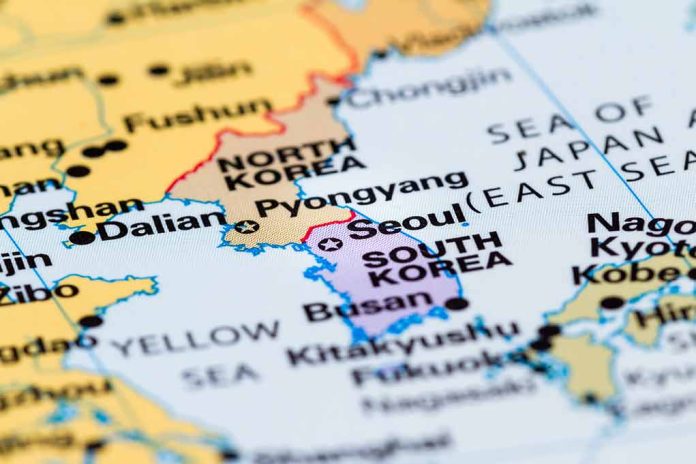
As President Yoon Suk-yeol’s political chaos unfolds in South Korea, the region faces possible changes in diplomatic relationships and strategic priorities.
At a Glance
- President Yoon’s martial law attempt risks international relations.
- Foreign policy may shift towards the U.S. and Japan whilst distancing from China.
- The impeachment process of President Yoon has been initiated with public backing.
- There are potential impacts on U.S.-ROK alliances and regional stability.
- The martial law withdrawal reflects adherence to democratic norms.
Political Disruption and Foreign Relations
President Yoon Suk-yeol’s failed attempt to declare martial law has plunged South Korea into political chaos. This action threatens to severely damage international relations, especially as public and political support grows for his impeachment. Yoon’s presidency was marked by efforts to distance South Korea from economic reliance on China, fostering closer ties with the U.S. and Japan. The attempt at martial law represents a critical juncture that could lead to profound modifications in these policies.
The impeachment procedure against Yoon highlights the domestic discontent with his governance. Political analysts believe that if Yoon is removed, Prime Minister Han Duck-soo will temporarily assume his duties. This could steer South Korea towards new domestically focused explorations and possibly gut critical defense agreements with Japan, such as the General Security of Military Information Agreement (GSOMIA).
South Korea is in turmoil after President Yoon Suk Yeol declared martial law and sealed off parliament to block lawmakers from voting.
n another dramatic moment, a South Korean woman was seen confronting soldiers in front of the National Assembly.#southkorea #seoul pic.twitter.com/L00686dyuA— CGTN Europe (@CGTNEurope) December 4, 2024
Implications for Regional Strategy
The President’s audacious bid to use martial law to control “anti-state forces” comes at a steep cost potentially deepening South Korea’s political crisis and affecting its image internationally.
“The unraveling of the Yoon presidency is great news for China and bad news for the US and Japan,” said Richard McGregor, senior fellow for East Asia at the Lowy Institute in Sydney.
Beyond damaging his domestic political standing, the martial law scare and subsequent impeachment efforts against Yoon may obstruct U.S. strategies in East Asia aimed at curbing Chinese influence. Observers note, however, that thanks to strong democratic frameworks and international cooperation, a coup is unlikely to emerge. Instead, more immediate impacts are seen in halting U.S.-South Korea scheduled meetings and risk destabilizing key U.S. alliances in the region.
Future Prospects and International Reactions
In light of these developments, American diplomatic circles have underlined the necessity for peaceful resolutions to political disputes and the value of maintaining established alliances between nations. U.S. Secretary of State Antony Blinken remarked on the situation, expressing support for Korean democracy and the established U.S.-ROK alliance, highlighting shared democratic values and legal principles.
“The United States has watched closely developments over the last 24 hours in the Republic of Korea. We continue to expect political disagreements to be resolved peacefully and in accordance with the rule of law,” said Blinken.
With the prospect of a new progressive political wave, spearheaded by candidates like Lee Jae-myung, potentially challenging Yoon’s policies, South Korea’s foreign relations could tilt towards greater independence in U.S.-China matters. Nonetheless, the enduring presence of 28,000 U.S. troops stationed in the country underscores the stable nucleus of the security-centric U.S.-ROK relationship, especially against the backdrop of a technically ongoing war with North Korea.





